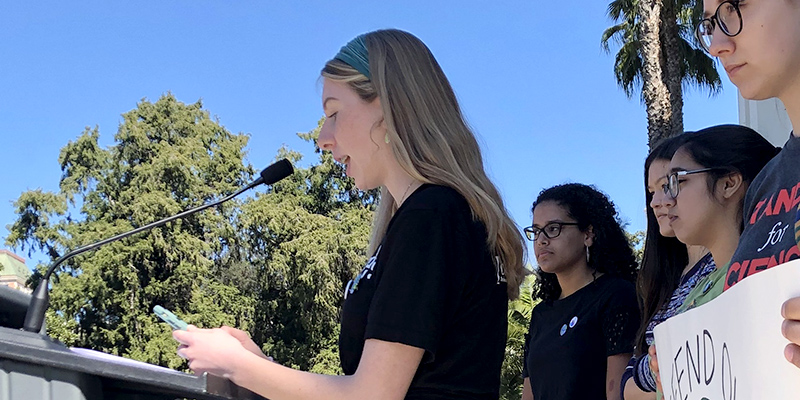
Ellinor Arzbaecher (left) speaking at the Sacramento Capitol building during a climate strike event (Photo courtesy of: Ellinor Arzbaecher)
California Forward is committed to advancing policy intersections that create a more inclusive and sustainable California where all people can prosper. To move this forward, we must address the racial and geographic inequities that have been exacerbated by a public health and economic crisis, and we must answer the call to dismantle structural racism. The Voices of Shared Prosperity series amplifies the stories of Californians who are committing their time and talent to solutions that embrace equity, the environment, and the economy.
Climate activist Ellinor Arzbaecher exemplifies one of Rahm Emmanuel’s most notable quotes “You never let a serious crisis go to waste.” Although COVID-19 kept her from having a high school graduation, a senior prom and many of the other moments she looked forward to up to this point, she is focusing on what can be a silver lining. The nation is facing an important moment in how it will respond to undeniable health disparities in the wake of a global pandemic and a growing social movement that is calling for equality and accountability in the systems that are charged with upholding these values.
 In recognition of current events, she says “This is really the chance to change it all. We’ve been saying for so long that we can’t have business as usual or that we can’t keep doing what we were doing. Everything is basically at a standstill now and we don’t have to go back to the way things were before and we can make differences now.”
In recognition of current events, she says “This is really the chance to change it all. We’ve been saying for so long that we can’t have business as usual or that we can’t keep doing what we were doing. Everything is basically at a standstill now and we don’t have to go back to the way things were before and we can make differences now.”
Arzbaecher says her sense of urgency was prompted by Greta Thunberg’s, 2019 World Economic Forum speech Our House Is On Fire. The speech clearly outlined a very immediate need for drastic collaborative changes and in no uncertain terms detailed the irreversible damage that would be done to the planet if current generations fail to act now.
Arzbeacher recalled feeling very fearful about the future of the environment and disappointed that she, and so many other people, would not be able to fully explore their interests or be given space to achieve their goals.
While attending a climate strike in Sacramento last year, she performed a poem that she wrote about climate change. She credits that experience with motivating her choice to lean in to climate activism saying “this is how I can go about focusing on the issues that scare me rather than just feeling that emotion. [I was able to] channel that fear into action.”
So, what can the state do to secure a more environmentally sustainable future? Arzbaecher shared some thoughts:
- Equitable access – Make sure that low-income and communities of color have access to sustainable options related to clean air, food, housing and transportation. These changes need to happen with everyone, all together, at the same time but that cannot work if some people don’t have access to the resources to be more environmentally friendly at a reasonable price and with reasonable convenience. Arzbaecher insists that environmental equity and social equity are inextricably linked and a failure to recognize this idea is a deep discount to the value of collaborative action and holistic solutions.
- Transition the economy – Move our economy from one based on fossil fuel to one that is more rooted in green infrastructure. This effort can open new and emerging employment sectors that have increased sustainability and decreased negative health impacts for workers.
- Increase environmental science in the K-12 system – Increase education around these issues so people can make informed intelligent decisions. Climate change and environmental sustainability is not currently being taught in schools but this generation of students will inherit this issue.
- Rebuild a more sustainable and inclusive economy – Look at how we can rebuild in a way that lifts people up rather than contributing to existing disparities. COVID-19 has forced us to look at the gaping inequalities in our healthcare and social systems. An economy based on green infrastructure can offer more opportunities for jobs that don’t require advanced degrees but still offer livable wages.
- Support strong intergenerational approaches – Collaborating not pointing fingers. Youth really have the drive and the passion to make these changes, but might not have the resources and the power to move them forward. Many people who have power and influence are leaving these issues to be addressed by future generations but they need to work together now with younger generations.
Arzbeacher is a member of the Young Leaders Advisory Council for the 2020 California Economic Summit to be held on December 3-4. She has been accepted into UC Berkeley, Rausser College of Natural Resources and plans to attend in the fall. She continues to provide leadership and support on issues related to environmental and social justice and uses her platform to explore ways to educate people and inspire others to examine their priorities.
Instagram: @elli.arz
Twitter: @elliarzbaecher
Arzbaecher is a part of the following organizations and she invites others to be informed and engaged:
- 350 Sacramento (@350sacramento on Instagram)
- Fridays for Future Sacramento (@fridaysforfuturesac on Instagram)
- Sunrise Movement Sacramento (@sunrisemvmtsac on Instagram)
- Earth Uprising (@earth_uprising on Instagram)
The Voices of Shared Prosperity stories will be shared in advance of the 2020 California Economic Summit, taking place on December 3-4.

